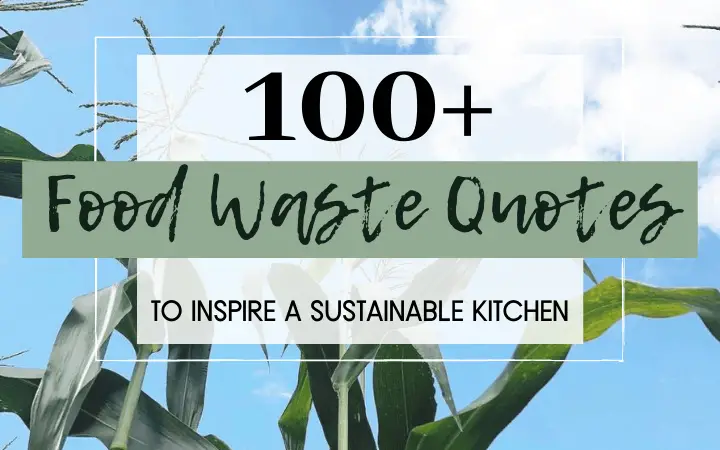
Jump Ahead To...
These 100+ best food waste quotes will inspire you to never throw food away again!
We all have room for improvement when it comes to wasting less food. That’s why I’ve put together a huge list of my favorite food waste quotes to inspire a more sustainable kitchen!
Food waste is a major global issue. According to the United States Food and Drug Administration (FDA), nearly 30-40% of the food supply is wasted.
Unfortunately food is wasted at all levels of the supply chain– from farm production to food distributors to grocery stores, and restaurants. Most importantly, it’s consumers that waste the most.
That’s right. More than half of total food wastage occurs at home (nearly 57%) per the Commission for Environmental Cooperation.
Related: 20 Easy Food Waste Hacks to Implement at Home
To inspire your journey to waste less food, I’ve put together over 100 quotes regarding food waste from:
- famous global chefs
- books about food waste
- food waste documentaries
- environmental activists
- food waste organizations
You’ll find food waste quotes from the late Anthony Bourdain and Mossimo Bottura, the Italian chef and current owner of the three-Michelin-star restaurant, Osteria Francescana.
The documentaries Wasted and Just Eat It have a ton of great quotes about food wastage. There are also quotes from environmental activists like Rob Greenfield, Tristram Stuart, and Bea Johnson, for example.
Don’t forget about the Don’t Waste Food government campaign from World War 1. The lessons still apply today, especially with pandemics, more frequent natural disasters, the rising population, and global warming.
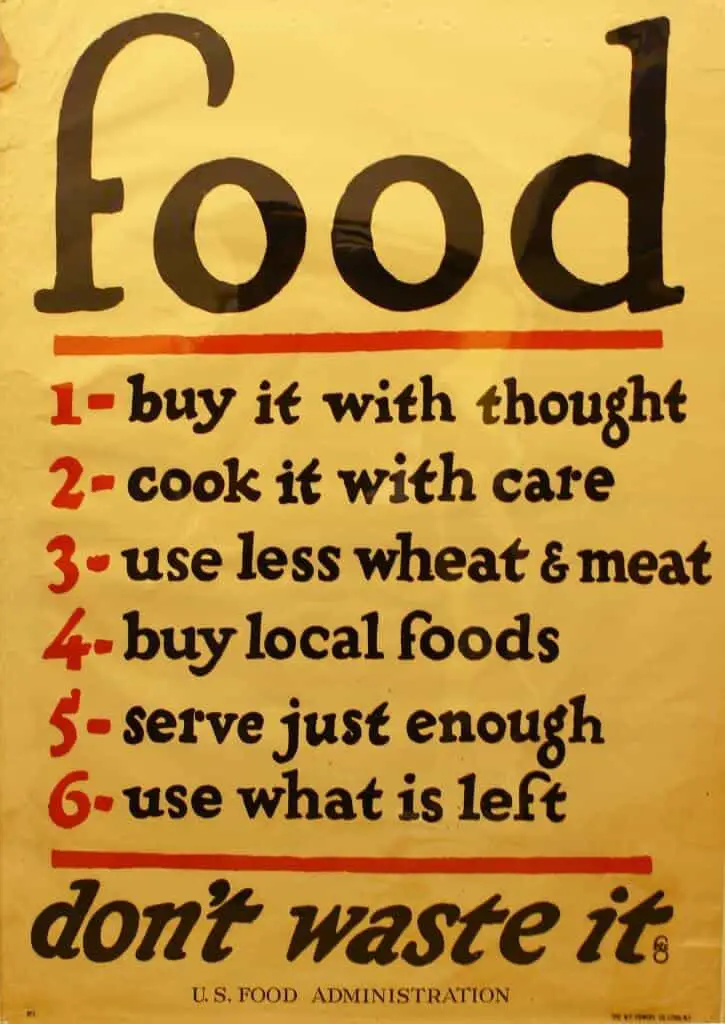
Check out all 100+ food waste quotes below!
Food Waste Quotes from Famous Global Chefs
Professional chefs are schooled early on about the importance of reducing food waste. Chefs often preach that wasting food shows disrespect toward the farmer, the land where food is produced, and finally to the animal or plant itself.
I couldn’t agree more.
These food waste quotes from global chefs will inspire you to get creative in the kitchen!
Chef Mossimo Bottura
Italian Chef Mossimo Bottura deserves his own section for food waste quotes. He’s been a food waste advocate from the beginning. Therefore, his expertise on preventing food waste continues to be featured in documentaries and books, many of which are mentioned later in the post.
“The most valuable lesson of the Italian kitchen is to never throw anything away: no crumbs or bones ever get thrown in the bin.”
–– Chef Massimo Bottura of Osteria Francescana
“The Italian kitchen has traditionally been one where very little is wasted. Every part of an animal is used, every part of a vegetable and even leftover ingredients are used.”
–– Chef Massimo Bottura of Osteria Francescana
“Straight out of the oven, a loaf of bread is good enough to be eaten as it is. Then the day after, it will be perfect to make pappa al pomodoro or bread pudding. Finally, after two days, the bread will make breadcrumbs for meatballs, passatelli and cakes.”
–– Chef Massimo Bottura of Osteria Francescana
“It is often said of a person that he or she is ‘beautiful inside’. A browned banana, a bruised fruit still has a huge potential in terms of smell, flavour, texture. Therefore, responsibility of the chef, as well as that of all of us cooking at home, is to find that inner beauty in each product.”
–– Chef Massimo Bottura of Osteria Francescana
“100 million people are starving. 1.3 billion tons of food is wasted every year. We do not need to produce more. Instead, we need to act different.”
–– Chef Massimo Bottura of Osteria Francescana
Food Wastage Quotes from other European Chefs
“It’s a matter of deriving flavor from otherwise byproducts or what would be considered waste in commercial kitchens. It’s not enough to ask people to put something on the plate because it’s the right thing to do. Instead we want people to enjoy it. We want people to come back to these ingredients as things with their own intrinsic value.”
–– Chef Kim Wejendorp, Head of R&D at Amass Restaurant in Copenhagen known for its zero waste kitchen
“The more sustainable we are, the healthier we are. Similarly, the more human we are, the better. Because to cook is to care.”
–– Joan Roca, chef and co-owner of El Celler de Can Roca
North American Chefs
“There is absolutely no substitute for the best. Good food cannot be made of inferior ingredients masked with high flavor. It is true thrift to use the best ingredients available and to waste nothing.”
― James Beard, American chef, cookbook author, and teacher for which the James Beard Award is named after
“I credit my grandmother for teaching me to love and respect food. She taught me how to waste nothing, and to make sure I used every bit of the chicken. Finally, to boil the bones till no flavor can be extracted from them.”
–– Marcus Samuelsson, Ethiopian Swedish chef and restaurateur of Red Rooster in Brooklyn, NY
“Many of the items that we consider “waste” are culinary staples in other cultures because people have found a way to make them delicious through good cooking.”
–– Chef Dan Barber of renowned West Village restaurant, Blue Hill
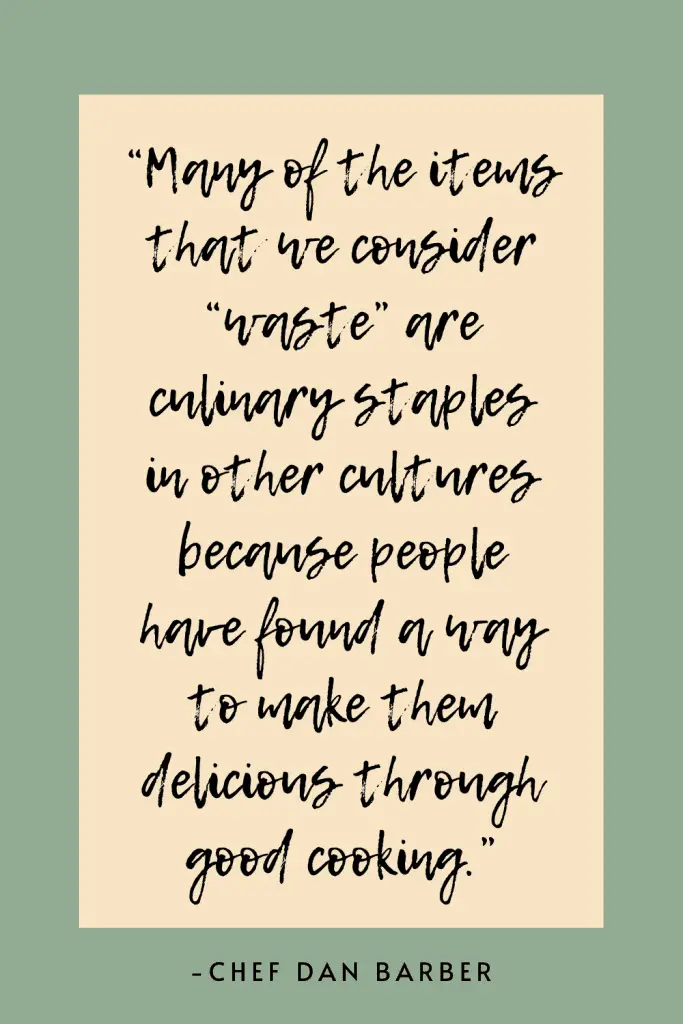
“This idea isn’t confined to white tablecloths. Just look at the world’s great food cultures, which were built on resourcefulness—an imperative to utilize every part of every ingredient, in the field and in the kitchen. Embracing those food traditions is hopefully another way to find new applications in the everyday.”
–– Chef Dan Barber, Blue Hill Restaurant
“Delicata squash stems are a delicacy in Mexico.”
–– Chef Dan Barber, Blue Hill Restaurant
“The problem is not actual number of calories we are producing – we have food waste issues. The problem is industrial food.”
–– Kimbal Musk (Kitchen Restaurant Group)
South American Chefs
“To understand diversity is to understand flavours, mysticism, tradition, innovation, colours, textures, culture, sustainability, nature, health, traceability, ecology, the history behind each ingredient, and above all, our identity.”
–– Malena Martínez, Head of the Mater Iniciativa research project behind Central, Mil and Kjolle restaurants
“We have a power. A power to transform a forgotten, an unknown, an undervalued ingredient into a sexy ingredient. So let’s use this power. Similarly, let’s feed people with love and maybe food can be a way to express it.”
–– Chef Alex Atala of D.O.M. in São Paulo
Cookbook Food Waste Quotes
There are tons of books and cookbooks focused on reducing food waste and utilizing all parts of the plant or animal. These cookbook food waste quotes will definitely inspire a sustainable kitchen.
I’ve linked the featured books if you’d like to add them to your kitchen collection.
Root to Leaf

Root to Leaf is Steven Satterfield’s cookbook highlighting ‘root to stem’ cooking. This style of cooking utilizes the whole plant– including the root, stem, leaves, bulb, and even flower!
Steven Satterfield was 2017’s ‘Best chef southeast’ James Beard award winner. Similarly, he knows a thing or two about cooking without waste.
“Where my friend saw nothing, I saw possibility.”
–– Steven Satterfield, Root to Leaf
“Americans have been conditioned to believe ‘more is better.’ It is a first-world problem to have everything you want, anytime you want it. As a result, this type of thinking has done some serious damage to our food systems and collective health.”
–– Steven satterfield Root to Leaf
“(in Paris) You simply walk from shop to shop on your way home and pick up what you need for the next day: bread, cheese, vegetables, fruits, and wine.”
–– Steven Satterfield, Root to Leaf
“Think about families that lived off their farms before industrialized food systems.
–– Steven Satterfield, Root to Leaf
If (a family) harvested a pig, every single part of that animal would be used for something: pickled trotters, brains and eggs, liver pudding, chitterlings, breakfast sausage, pork chops, country ham, picnic shoulder, bacon, fat back, and so on.”
–– Steven Satterfield, Root to Leaf
“Fennel is one of the few plants that have three uses: as a vegetable, and herb, and a spice.”
–– Steven Satterfield, Root to Leaf
In Defense of Food

Michael Pollan’s New York Time’s best selling manifesto touches on food waste’s impact on the modern food system.
“A program to make municipal composting of food and yard waste mandatory and then distributing the compost free to area farmers would shrink America’s garbage heap, cut the need for irrigation and fossil-fuel fertilizers in agriculture, and improve the nutritional quality of the American diet.”
–– Michael Pollan, In Defense of Food
Related: 16 Methods of Composting for a Greener Home
Bread is Gold

Massimo Bottura’s Bread is Gold inspires home cooks on every budget to cook with a conscious using ‘wasted’ ingredients.
“Bread is Gold is a metaphor for giving value to the simplest things in life that we often overlook. It is a way of looking at the world, looking at your pantry and finding inner beauty in the humblest ingredient.”
–– Chef Massimo Bottura of Osteria Francescana
“There are nearly a billion undernourished people in the world– but all of them could be fed with just a fraction of the food that rich countries currently throw away.”
–– Tristram Stuart, Food Waste Activist and author
“[Reducing food waste] is not like the tough dilemma of whether to forgo car or plane travel, or give up eating meat. We can reduce our impact on the planet just by using food instead of throwing it away.”
––Tristram Stuart, Food Waste Activist and author
“It would not be beyond any of us to realize that food ownership carries with it a weight of responsibility– an understanding that we are its custodians, bound to treat it carefully.”
––Tristram Stuart, Food Waste Activist and author
Waste Free Kitchen Handbook

The Waste Free Kitchen Handbook is packed with practical strategies and helpful resources to help anyone reduce their kitchen carbon footprint. It’s authored by Dana Gunders, a national expert and strategic advisor for food waste reduction.
“Today we waste 50% more food in the United States than we did in the 1970’s.”
–– Dana Gunders, Waste Free Kitchen Handbook
“It takes the same amount of water to produce a hamburger as it does to take a 90 minute shower.”
–– Dana Gunders, Waste Free Kitchen Handbook
Cooking With Scraps

Lindsay-Jean Hard is a Food52 editor who creates delicious meals from peels, stems, cores, and rinds.
“Mottainai is a Japanese word that expresses regret regarding wastefulness. It manages to not only capture the shame of wasting a precious resource, but also hold onto the gratitude for what a gift (food, time, money, etc) it was in the first place.”
–– Lindsay-Jean Hard, Cooking with Scraps
“Hara hachi bu, an important part of the traditional Okinawan approach to eating, is a phrase that means ‘eat until you’re 80 percent full.”
–– Lindsay-Jean hard, Cooking with Scraps
Zero Waste Home

Bea Johnson, a French environmentalist, is considered the mother of the modern day Zero Waste movement! Her book Zero Waste Home has inspired communities around the world to create less waste.
“Although I do love my cookbooks, I do not choose a different recipe from them every night for dinner. My refrigerator would soon overflow with little bits of ingredients I didn’t use and all sorts of leftovers my diners may turn their noses up at. Instead, I get creative and use what I have on hand.”
–– Bea Johnson, Zero Waste Chef
Nose to Tail
Fergus Henderson, on the other hand, has been called the father of food waste! His restaurant, St John Street in London often uses offal and other neglected cuts of meat on the menu.
Offal refers to an animal’s organs and other parts that are often discarded. Cooking with offal inspired a ‘nose to tail’ cooking movement to utilize the whole animal.
“This is a celebration of cuts of meat, innards, and extremities that are more often forgotten or discarded in today’s kitchen. It would seem disingenuous to the animal not to make the most of the whole beast. In short, there is a set of delights, textural and flavorsome, which lie beyond the fillet.”
― Fergus Henderson, Nose to Tail
“Nose-to-tail eating is not a bloodlust, testosterone-fueled offal hunt. Instead, it’s common sense, and it’s all good stuff.”
–– Fergus Henderson, Nose to Tail
“If you’re going to kill the animal, it seems only polite to use the whole thing.”
–– Fergus Henderson, Nose to Tail
“We never talk about waste in the kitchen, because nothing is wasted. It is all delicious. Just remember that and most importantly, keep cooking with care and taking pleasure in the whole beast.”
–– Fergus Henderson, Nose to Tail
Offal Good: Cooking from the Heart, with Guts

Using the whole animal to reduce waste is a lost art. Top Chef winner Chris Cosentino and food photographer Michael Turkell aim to bring back that style of cooking.
“Using every part of the animal (or plant for that matter) is a moral obligation in a world where so many go without food, yet where so many others waste 40% of what foods they buy.”
–– Andrew Zimmern, American culinary expert, chef, and TV personality
“The tagline for Boccalone is ‘Tasty salted pig part’ which might seem amusing now, but in my grandparents’ time making the most of every scrap of meat, every cut from the animal, was fundamental.”
–– Chris Cosentino and Michael Harlan Turkell, Offal Good: Cooking from the Heart, with Guts
“Livers can be pureed smooth and silky, humming with mineral Earthiness, or knocking you over with their meaty aroma when seared hard.”
–– Chris Cosentino and Michael Harlan Turkell, Offal Good: Cooking from the Heart, with Guts
Food Waste Quotes about Offal
“Offal is all the other parts: the variety meats, the odd bits, the fifth quarter, the guts, the innards, the umbles, humble pie, bits and bobs.”
–– Chris Cosentino and Michael Harlan Turkell, Offal Good: Cooking from the Heart, with Guts
“Offal gives you an amazing variety of textures and flavors. Pig skin can be luxurious and velvety when braised; turned into a wild, rich spaghetti; or finally, puffed into crisp, airy chicharrones.”
–– Chris Cosentino and Michael Harlan Turkell, Offal Good: Cooking from the Heart, with Guts
“I grew to love all these cuts and became passionate about learning more and more about their traditional uses, their biological structure, the nutrition they provide (many are far more nutritious than muscle meats), and, of course how to highlight their best features.”
–– Chris Cosentino and Michael Harlan Turkell, Offal Good: Cooking from the Heart, with Guts
“Most every culture in the world eats and appreciates offal.”
–– Chris Cosentino and Michael Harlan Turkell, Offal Good: Cooking from the Heart, with Guts
“Offal was part of the American pantry. It continues to be a little more so in the south with it’s pickled pig’s feet, hog maws, and chitterlings (chitlins) –and also in many Asian and Latin American immigrant communities– but in the rest of the country it’s fallen off.”
–– Chris Cosentino and Michael Harlan Turkell, Offal Good: Cooking from the Heart, with Guts
“Only now are we starting to realize how important sustainable farming is, and to use the whole animal. Similarly, eating offal is an extension of honoring an animal that was harvested for our consumption. Above all, as a chef, my greatest goal is to close this circle.”
–– Chris Cosentino and Michael Harlan Turkell, Offal Good: Cooking from the Heart, with Guts
Inspired to create less waste? Download the 30 day zero waste challenge to create less trash!
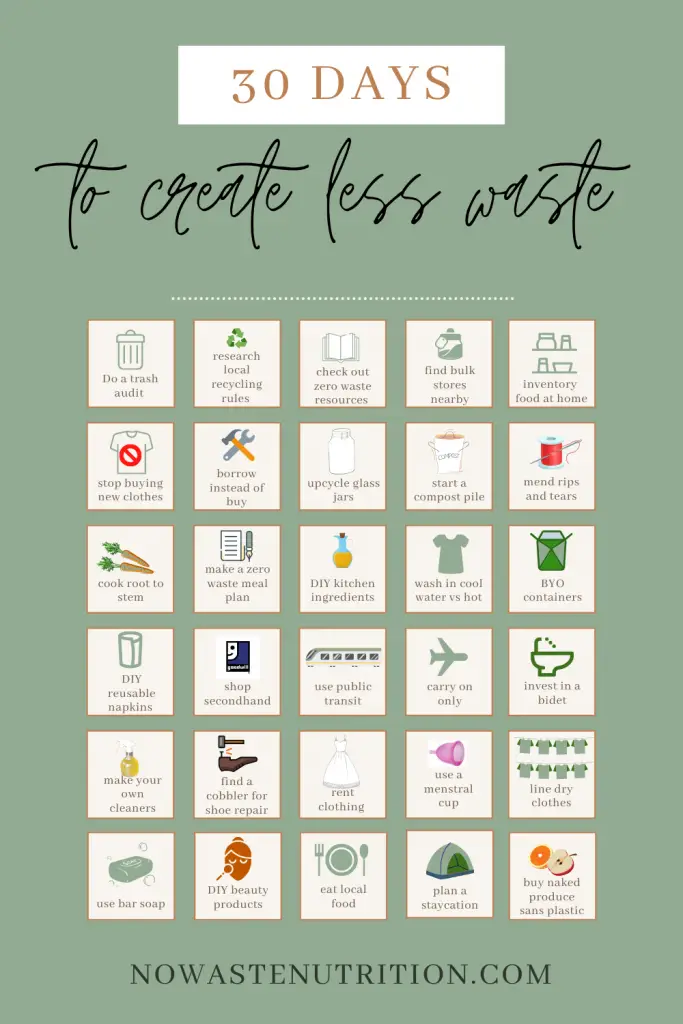
Food Waste Quotes from Documentaries
Two documentaries stand out in the fight against food waste– Wasted! the Story of Food Waste and Just Eat It.
Wasted! The Story of Food Waste

Wasted! was filmed to change the way people buy, cook, recycle, and eat food. The world’s most influential chefs turn scraps into delicacies, and show us practical ways to make changes in our own kitchen.
“Along with picking up a knife for the first time and learning how to use it, how to scramble an egg….the principal of “use everything, waste nothing” was pounded deep into my tissue.”
–– Anthony Bourdain Wasted!
“We need to harness the significance of peoples obsession with food right now, and understand how waste is sinful, criminal, as well as financially foolish.”
–– Mario Batali, Wasted!
“Food production is the single biggest cause of deforestation. The single biggest cause of water extraction. The single biggest cause of habitat loss and biodiversity loss. Meanwhile, one third of all of that impact is going on to produce food that ends up being wasted.”
–– Wasted!
“I really think that people connected with food learn to respect it and there’s something sac religious about destroying or wasting something that you consider valuable and consider important.”
–– Wasted!
“(in nature) Everything that’s left over from one part of the process becomes food for another part of the process. Modern agriculture could take a lesson from nature.”
–– Wasted!
“Like any pursuit, artistic or otherwise, the lack of choices usually inspire a kind of creativity that you’re forced into.”
–– Chef Dan Barber, Blue Hill in NYC
“It’s very hard to be creative in a way that’s inspired and original when your choices are limitless. Ultimately, that’s what I love about waste. You really have to look at your farm, and your purveyors, and your kitchen in a different light.”
–– Chef Dan Barber, Blue Hill in NYC
Food wastage quotes from Wasted! regarding culinary delicacies made from discarded food.
“Every cuisine that has lasted generations all have dishes that would be called wasted; but in fact are iconic, culture dishes, like bouillabaisse” (Fisherman’s wives took the damaged and unsellable fish and created fish stew).”
––Wasted!
“Prosciutto de parma is created from a waste fed pig, but you don’t call it ‘waste’ pork. They’re not sold as waste, but instead, sold as what they are– delicious dishes.”
–– Wasted!
More General Food Waste Quotes from Wasted!
“To me, it’s sort of funny that wasting food is not a taboo. It’s one of the last environmental ills that you can just get away with.”
–– Jonathan Bloom, Wasted!
“We waste food at every link in the supply chain. If you start on farms, entire fields of crops are sometimes being wasted just because the supermarket has said that it doesn’t look perfect.”
–– Wasted!
“Cauliflower is a perfect example of a food with a lot of waste because of the size of leaves. None of the leaves typically get consumed, however they’re very, very delicious. The biomass of cauliflower plant is 40% cauliflower and 60% leaf.”
–– Wasted!
“Our food system should grow the right food, respect the people who are growing the food, and stuard the land growing the food. And do this in a way that produces good food for as many people as possible.
–– Mark bittman, How to Cook Everything
“When we buy food and throw it away, we are literally taking food off the shelves of the global food marketplace. We’re therefore taking food out of the mouths of the hungry.”
–– Tristram Stuart, environmental activist
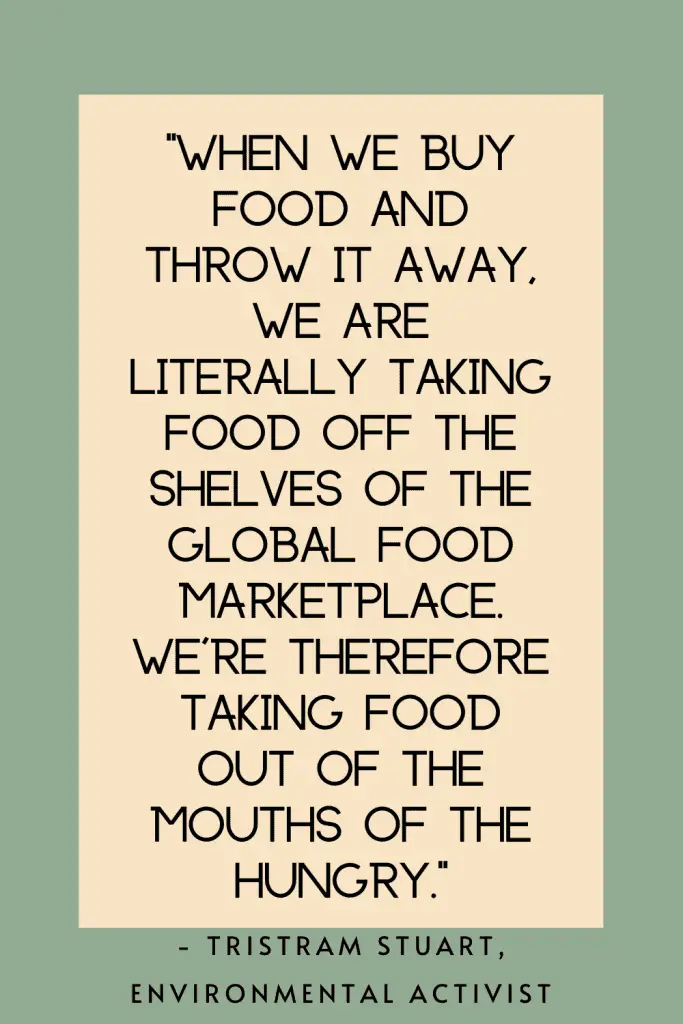
“It’s inconceivable that 1 in 5 children in America don’t have enough to eat during the richest time of the richest country’s history. And I think Americans don’t even see the face of hunger.”
––Tristram Stuart, environmental activist
Daily Table recovers food from supermarkets wholesalers and growers that would otherwise end up in the dumpster, including locally grown fruits and vegetables from nearby farms and farmers markets.
–– Founder Doug Rauch, Traders Joe’s former president
Just Eat It, A Food Waste Story

Film makers and foodies, Jen and Grant vow to eat only ‘wasted’ food in Just Eat It: A Food Waste Story.
“The farmers market has more people that are open to trying things that look different. However, a good crop still won’t sell if it has a slight blemish or something wrong aesthetically.”
–– Delaney Zayac, owner of Ice Caps Organics
Tristram Stuart Quotes About Food Waste from Just Eat It
“Cutting food waste is a delicious way of saving money, helping to feed the world and protect the planet.”
–– Tristram Stuart, UK food waste campaigner
“We are trashing our land to grow food that no one eats.”
–– Tristram Stuart, Just Eat It
“In the United States, under three percent of municipal food waste – so that’s the food scraps that goes into people’s garbage cans – actually gets recycled. On the other hand, if you go to a place like South Korea, the exact reverse is the case. It’s about three percent that doesn’t get recycled.”
–– Tristram Stuart, Just Eat It
“We fill our refrigerators to the point that we can’t possibly eat everything before it goes bad.”
–– Tristram Stuart, Just Eat it
“I went to a banana plantation, and after one day of harvest there was a truckload of bananas being wasted solely on the basis of cosmetic standards.”
–– Tristram Stuart, Just Eat It
“Banana plantations grow bananas for European supermarkets. Supermarkets tell you what diameter, length, curvature, and all of those parameters have to be exactly right for that supermarket. Therefore bananas basically look the same.”
–– Tristram Stuart, Just Eat It
Other food waste quotes from farmers and food retailers in Just Eat It
Retailer standards for food far exceed that which is placed on us by the state or USDA or federal standards for product.”
–– Harold Mcclarty, HMC Farms owner
“The amount of fruit left either in the field or discarded in the packing house is as high as 70% or as low as 20%.”
–– Harold Mcclarty, HMC Farms owner
“As a grower that’s heartbreaking. When you grow the fruit and there’s nothing wrong with it, but you can’t sell it. Certainly, that bothers me.”
–– Chris Holland supervisor, HMC farms
“The celery heart machine will cut the celery heart to length. Then the crews will peel a certain amount of stalks off to fit in the bag for retail. Therefore, one square foot of harvest will produce about 2 lbs of product that will get wasted.”
–– Cameron Anderson, Harvest Manager at Pacific International
Chef’s Table
Chef’s Table is an original Netflix series that highlights chefs across the world, along with their famous culinary creations. The docu-series certainly provide a new respect for food with each episode.
Dario Cecchini‘s Italian restaurant Solociccia was featured in season 6. His menu is focused on the ‘unwanted’ and often wasted parts of an animal that customers usually avoid.
“My way of paying respect to the animal, its life, its death, is using everything down to the last tendon with responsibility. This is what I have been doing every day for more than 45 years. Above all, I am a butcher from nose to tail.”
–– Chef and Butcher Dario Cecchini of Solociccia
“In the butcher shop, anything that the customer doesn’t want, is the family’s food. For example, my grandma cooked legs, snouts, and tails.”
–– Chef and Butcher Dario Cecchini of Solociccia
“Every time that I’m in front of the animal’s death, I think of the life, of the respect, and most importantly the responsibility of using everything well… of not offending this death. Not even a small bone will go wasted. That is being a butcher.”
–– Chef and Butcher Dario Cecchini of Solociccia
“At the beginning, I thought it wasn’t possible to follow my dreams, of taking care of the animals. But over the years, I understood that it’s not that a veterinarian saves the animals and the butcher kills them. It’s that we’re all together. Similarly, the veterinarian is the one that takes care of animals, and the butcher is the one who has the most important task of teaching humans that you have to value everything. Now I know where my place is– it’s behind the butcher’s chopping board. It’s my center of the world.”
–– Chef and Butcher Dario Cecchini of Solociccia
Food Waste Quotes from Philanthropists
Philanthropists see the devastating impact of food wastage first hand. It’s often hunger, poverty, and destruction of habitats that leave the biggest impression.
“I was born in London in England in 1934. I went through, as a child, the horrors of World War II, through a time when food was rationed and we learned to be very careful, and we never had more to eat than what we needed to eat. There was no waste. Certainly, everything was used.”
–– Jane Goodall, English primatologist and anthropologist
“We’re taught that food in a dumpster is waste. But when you find bags of bread that are perfectly good, all of a sudden that waste turns into bounty. That’s an important shift in perception.”
–– Zal Batmanglij, firm believer in Freeganism
“In many places in the developed world, we eat or waste probably twice as many food calories as we really need. We’re wasteful of food. We ship all over the world. Moreover, we’re now realizing that generating the energy to ship the food around the world is also ruining our climate.”
–– Nina Fedoroff, American molecular biologist
“Throwing away food is like stealing from the table of those who are poor and hungry.”
–– Pope Francis
“I don’t waste food, water, money, time and talent.”
–– Amit Kalantri, author
“You waste life when you waste good food.”
–– Katherine Porter, journalist, activist
“Feel what it’s like to truly starve, and I guarantee that you’ll forever think twice about wasting food.”
–– Criss Jami, American poet, essayist, and philosopher
“I’m frugal. I’m not a very acquisitive woman. I never waste food. If you prepare your own food, you engage with the world, it tastes alive. Above all, it tastes good.”
–– Vivienne Westwood, British fashion designer
Quotes about Food Wastage from Rob Greenfield
Rob Greenfield is an activist who regularly takes on extreme Earth friendly challenges. Some of them include:
- eating only food he foraged or grew for 1 year
- biking across the entire United States (on a bike made of bamboo) and dumpster diving for food
- and lastly, bathing only in natural water sources for 1 year
He’s written books to chronicle some of his attention grabbing challenges. For instance, Food Freedom and Dude Making a Difference seen below.
“City after city, I’d roll around back of the grocery story and found dumpster after dumpster after dumpster was filled to the brim with perfectly good food.”
–– Rob Greenfield, Environmental Activist
“I found enough food to feed about 100 families in a dumpster in Nebraska. I was eating like a dumpster king, while still riding my bike across the nation every single day.”
–– Rob Greenfield, Environmental Activist
“We waste a ton of food in the United States per year–165 billion dollars worth of food per year. To put that into perspective, that’s more than the budgets for America’s national parks, public library, veteran healthcare, all the federal prisons, the FBI and the FDA combined.”
–– Rob Greenfield, Environmental Activist
“In the US, we waste about half of all the food we produce. In other words, we produce enough food to feed about two entire American populations. All while 50 million Americans are food insecure.”
–– Rob Greenfield, Environmental Activist
“Only 13% of excess food from grocery stores get donated to non profits.”
–– Rob Greenfield, Environmental Activist
General Food Waste Quotes and Statistics
In the United States, 40% of the food we produce is going to waste.
– Environmental Protection Agency
Over 1/3 of all food produced globally goes to waste, which is worth nearly $1 trillion at retail prices.
– National Geographic
An area larger than China is used to grow food that gets wasted.
–– Food and Agriculture Organization of the United Nations
If food waste were a country, it would be the 3rd largest emitter of greenhouse gases (after China and the United States).
–– Food and Agriculture Organization of the United Nations
Each year consumers in rich countries waste as much food as the net food production of sub-Saharan Africa.
–– Food and Agriculture Organization of the United Nations
“Imagine walking out of a grocery store with four bags of groceries, dropping one in the parking lot, and just not bothering to pick it up. That’s essentially what we’re doing.”
–– Dan Gunders, Natural Resources Defense Council
Biblical Quotes About Food Waste
Finally, there are many food waste quotes from different world religions. A few favorites are found below.
Gleaning is the act of collecting leftover crops from fields after harvest noted in the Hebrew Bible. This became a legally enforced entitlement of the poor in a number of Christian kingdoms.
“When you reap the Harvest of your land, do not reap the very edges of your field or father the gleanings of your harvest. Therefore leave them for the poor…”
–– Leviticus 23:22
“When they had all had enough to eat, Jesus said to his disciples, ‘Gather the pieces that are leftover. Let nothing be wasted.'”
–– John 6:12
From Judaism: bal tashchit which means “thou shalt not waste”
Islam: “Allah loveth not the wasters”
In summary, there are countless quotes on food waste from every corner of the world. Above all, our goal should be to waste less food and respect the planet’s natural resources.
Inspired to waste less food yet? Then, take the 30 day challenge to create less trash! Click on the image below to download the 30 day roadmap!






Leave a Reply